Brake Booster (W/O Vsc) -- Installation |
| 1. INSTALL BRAKE BOOSTER ASSEMBLY |
Install a new gasket to the brake booster.
Install the booster with the 4 nuts.
- Torque:
- 14 N*m{145 kgf*cm, 10 ft.*lbf}
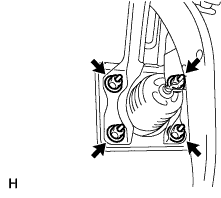 |
Install the push rod clevis.
Apply a light coat of lithium soap base glycol grease to the clevis pin.
Install the clevis pin and a new clip.
- NOTICE:
- The clip must be installed as shown in the illustration.
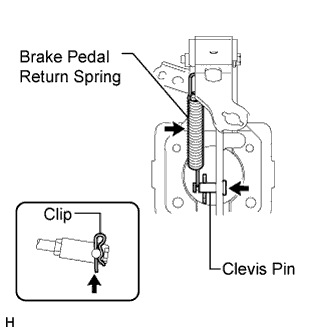 |
Install the return spring.
Install the grommet and check valve to the booster.
Connect the vacuum hose.
Install the vacuum warning switch to the booster and connect the vacuum warning switch connector.
- Torque:
- 14 N*m{139 kgf*cm, 10 ft.*lbf}
| 2. CHECK AND ADJUST BRAKE BOOSTER PUSH ROD |
- NOTICE:
- The brake booster interior must not be a vacuum when adjusting the booster. Stop the engine and depress the brake pedal several times until there is no vacuum in the booster.
- HINT:
- Adjust the booster push rod when the master cylinder is replaced with a new one. Adjustment is not necessary when the master cylinder is reinstalled and the booster is replaced with a new one.
Set SST on the master cylinder and lower the rod of SST until it just touches the piston.
- SST
- 09737-00013
- HINT:
- SST 09737-00012 can also be used.
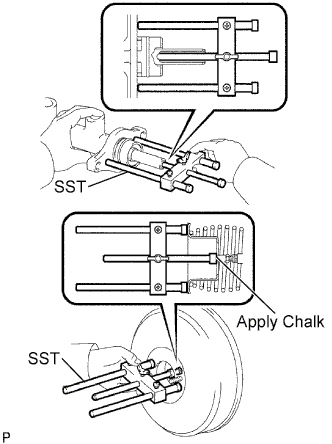 |
Apply chalk to the flat of the rod of SST. Turn SST upside down and measure the clearance between the brake booster push rod and SST.
- Standard clearance:
- 0 mm (0 in.)
If the chalk does not stick to the tip of the brake booster push rod, the push rod protrusion is insufficient.
If the clearance is not as specified, adjust the length by holding the rod using SST and turning the tip of the rod using a 7 mm socket driver.
- SST
- 09737-00020
- NOTICE:
- Check the push rod clearance again after adjusting.
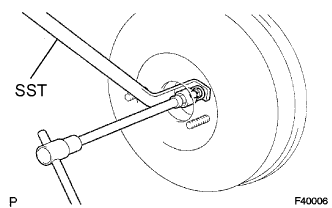 |
| 3. INSTALL BRAKE MASTER CYLINDER SUB-ASSEMBLY |
Install the brake master cylinder (Toyota Fortuner RM000001HK601UX.html).
| 4. FILL RESERVOIR WITH BRAKE FLUID |
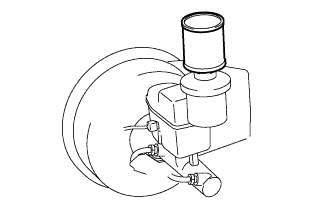 |
- Fluid:
- SAE J1703 or FMVSS No. 116 DOT 3
| 5. BLEED AIR FROM BRAKE MASTER CYLINDER |
- HINT:
- If the master cylinder has been disassembled or if the reservoir becomes empty, bleed air from the master cylinder.
Using SST, disconnect the 2 brake lines from the master cylinder.
- SST
- 09023-00101
Slowly depress and hold the brake pedal.
 |
Cover the outer holes with your fingers, and release the pedal.
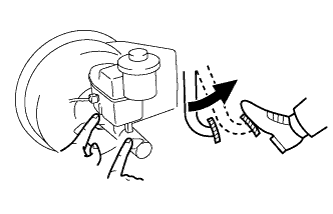 |
Repeat the 2 previous steps 3 or 4 times.
Using SST, connect the 2 brake lines to the master cylinder.
- SST
- 09023-00101
- Torque:
- 15.2 N*m{155 kgf*cm, 11 ft.*lbf}without SST
- 14 N*m{143 kgf*cm, 10 ft.*lbf}with SST
- HINT:
- Use a torque wrench with a fulcrum length of 30 cm (11.81 in.).
| 6. BLEED AIR FROM BRAKE LINE |
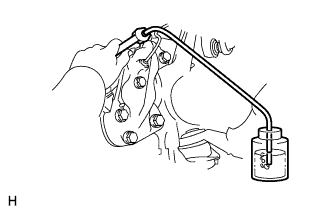 |
Remove the bleeder plug cap.
Connect a vinyl tube to the bleeder plugs.
Depress the brake pedal several times, and then loosen the bleeder plug with the pedal depressed.
When fluid stops coming out, immediately tighten the bleeder plug. Then release the pedal.
Repeat the 2 previous steps until all the air in the brake fluid is gone.
Tighten the bleeder plug.
- Torque:
- 10.8 N*m{110 kgf*cm, 8 ft.*lbf}for front brake
- 10 N*m{102 kgf*cm, 7 ft.*lbf}for rear brake
Install the cap.
Bleed air from the brake line for each wheel by repeating the above procedures.
| 7. BLEED AIR FROM CLUTCH LINE (for Manual Transmission) |
 |
Remove the bleeder plug cap.
Connect the vinyl tube to the bleeder plug.
Depress the clutch pedal several times, and then loosen the bleeder plug with the pedal depressed.
At the point when fluid stops coming out, tighten the bleeder plug, and then release the clutch pedal.
Repeat the previous 2 steps until all the air in the fluid is completely bled out.
Tighten the bleeder plug.
- Torque:
- 11 N*m{112 kgf*cm, 8 ft.*lbf}
Install the bleeder plug cap.
Check that all the air has been bled out of the clutch line.
| 8. CHECK AND ADJUST BRAKE PEDAL HEIGHT |
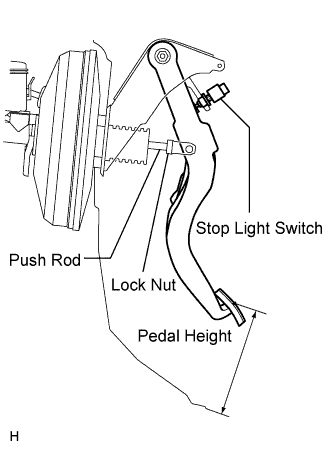 |
Check the pedal height.
- Standard pedal height from dash panel:
Model Specified Condition for LHD 152.9 to 162.9 mm (6.020 to 6.413 in.) for RHD (Manual Transmission) 156.9 to 166.9 mm (6.177 to 6.571 in.) for RHD (Automatic Transmission) 158.1 to 168.1 mm (6.224 to 6.618 in.)
Adjust the pedal height.
Disconnect the connector from the stop light switch.
Remove the switch.
Loosen the push rod clevis lock nut.
Adjust the pedal height by turning the push rod.
Tighten the lock nut.
- Torque:
- 26 N*m{265 kgf*cm, 19 ft.*lbf}
Insert the switch into the adjuster until it slightly touches the pedal.
- NOTICE:
- Do not depress the pedal.
Turn the switch a quarter turn clockwise.
- Torque:
- 1.5 N*m{15 kgf*cm, 13 in.*lbf}
- NOTICE:
- Do not depress the pedal.
Connect the connector to the switch.
Check the switch clearance.
- Standard stop light switch clearance:
- 1.5 to 2.5 mm (0.059 to 0.098 in.)


| 9. CHECK BRAKE PEDAL FREE PLAY |
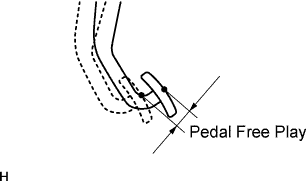 |
Stop the engine. Depress the pedal several times until there is no vacuum in the booster. Then release the pedal.
Depress the pedal until resistance is felt.
Check the pedal's free play by measuring the distance between the position in the previous step and the pedal's released position.
- Standard pedal free play:
- 1.0 to 6.0 mm (0.039 to 0.236 in.)
If the free play is as specified, proceed to the "CHECK BRAKE PEDAL RESERVE DISTANCE" procedure.
Check the switch clearance.
- Standard stop light switch clearance:
- 1.5 to 2.5 mm (0.059 to 0.098 in.)
If the clearance is as specified, troubleshoot the brake system and proceed to the "CHECK BRAKE PEDAL RESERVE DISTANCE" procedure.
| 10. CHECK BRAKE PEDAL RESERVE DISTANCE |
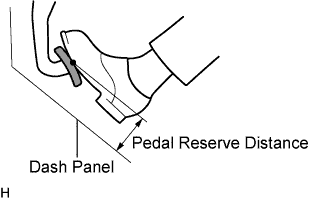 |
Release the parking brake lever. Start the engine.
Depress the pedal and check the pedal reserve distance.
Depress the pedal with a force of 490 N (50 kgf, 110 lbf).
Measure the distance between the pedal and dash panel shown in the illustration.
- Standard pedal reserve distance:
Model Specified Condition for LHD 85.0 mm (3.347 in.) for RHD 89.0 mm (3.504 in.)
| 11. CHECK BRAKE FLUID LEVEL IN RESERVOIR |
 |
Check the fluid level and add fluid if necessary.
- Fluid:
- SAE J1703 or FMVSS No. 116 DOT 3
- HINT:
- Add fluid to a level between the reservoir's MIN and MAX lines.
| 12. CHECK FOR BRAKE FLUID LEAKAGE |